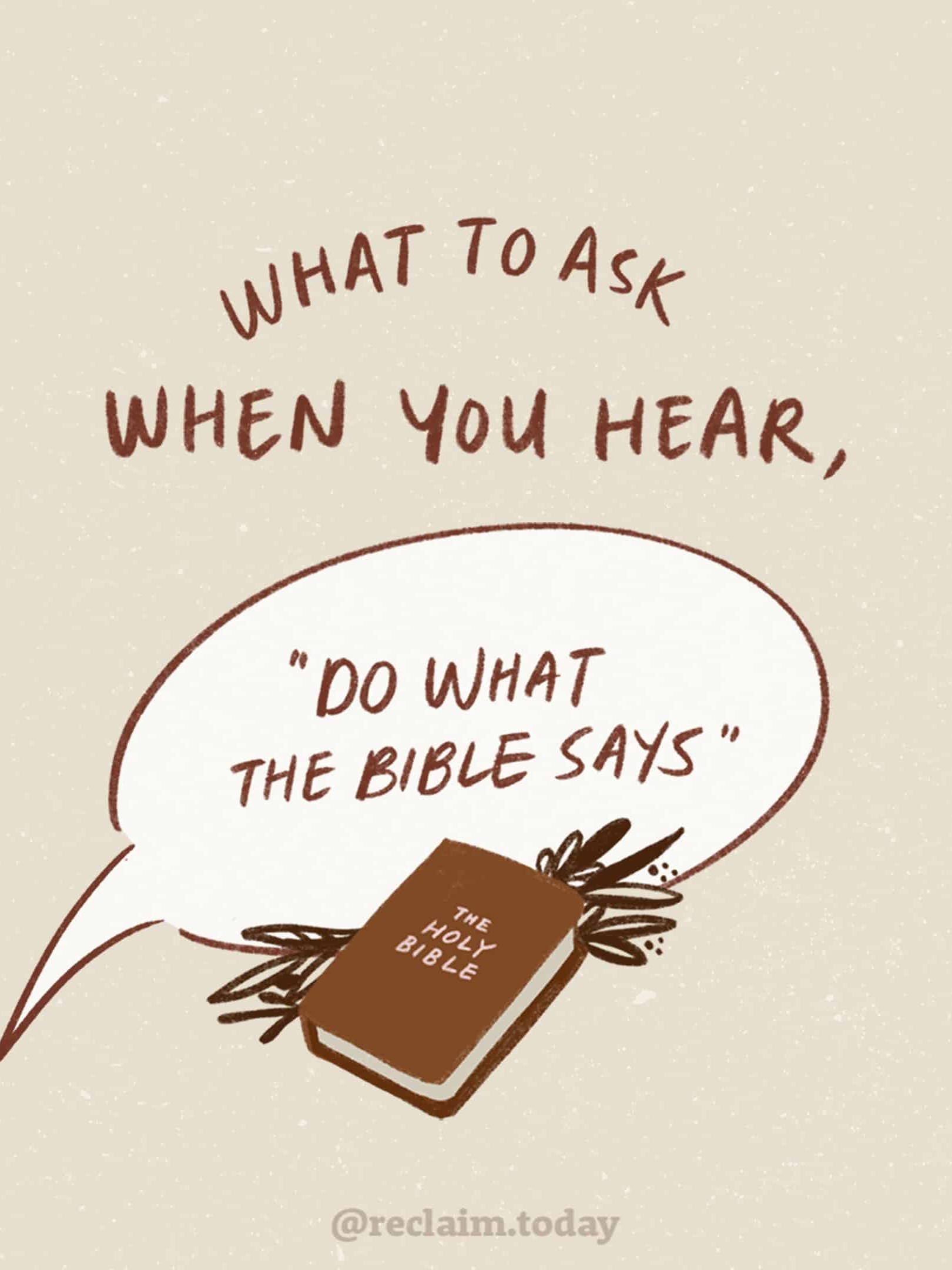“Do what the Bible says.” We’re sure someone has said this to you before… We’ve heard it often enough! As vital as the Bible is, we’re starting to think it’s also way more complex than most of us realize.
We talk about the Bible a lot in the work we do at Reclaim Today. Christians talk about the Bible a lot. A lot of people want to know if certain actions or decisions are “biblical.” Many of us want to know how to “properly” read the Bible, or how it supports certain opinions we have. There have likely been plenty of times we’ve tried to discern if messages from certain leaders are “based on the Bible.”
Something we’re learning is that it matters (so much!) how we think and talk about the Bible. Since this is so foundational to everything else we could possibly discuss, we wanted to spend some time unpacking it. We’ve pulled together a handful of common questions about how to interpret the Bible, and some answers you might find surprising. Ultimately, our goal is to ask questions, seek answers, and trust God to lead us to a healthier, more whole understanding of this amazing gift of the Bible. Join us!

1. Is the Bible an answer book for life?
If you’ve spent any time around Christians, you’ve probably heard someone mention the Bible told them to do (or not do) X. Or, if you’ve ever been faced with a difficult choice, you might have been challenged by fellow Christians to “back your decision up with a verse.”
But can we really count on the Bible to have an answer and verse for each of life’s (very specific) questions? Don’t get us wrong, the Bible has answers—lots of them! It has answers for really important questions.
What is our primary calling as humans? To love God and love others (Matthew 22:37-39).
What should we spend our time doing? Seeking justice, loving mercy, and walking humbly with God (Micah 6:8).
How do we worship? By caring for orphans and widows (James 1:27), and offering ourselves in service to God and others (Romans 12:1).
But the Bible is not first and foremost an answer book. Instead, it’s first and foremost a big story, made up of little stories, with wisdom that flows out of those stories.
For example: In the Matthew 22 passage mentioned above, when people asked Jesus, “What is the greatest commandment?”, he responded with the commands to love God with all that we are, and to love others as ourselves (vv. 37-39). This is a small story that’s part of a bigger story (Jesus’s life as it’s presented in the book of Matthew), which is part of the bigger story of the whole Bible. And from it, flows a really helpful summary of what it looks like to obey God.
This helpful summary doesn’t tell us what to do (no clear directive about whether you should say “yes” to the job offer you’re considering), but offers a broad space to figure out what it means to love God and love others in everyday life.
So, is the Bible an answer book? Not really. It’s a story that points us to Jesus as the author and finisher of our faith (Hebrews 12:2), who offers the Spirit of Truth (John 16:13) to guide us into all wisdom (Proverbs 2:6).
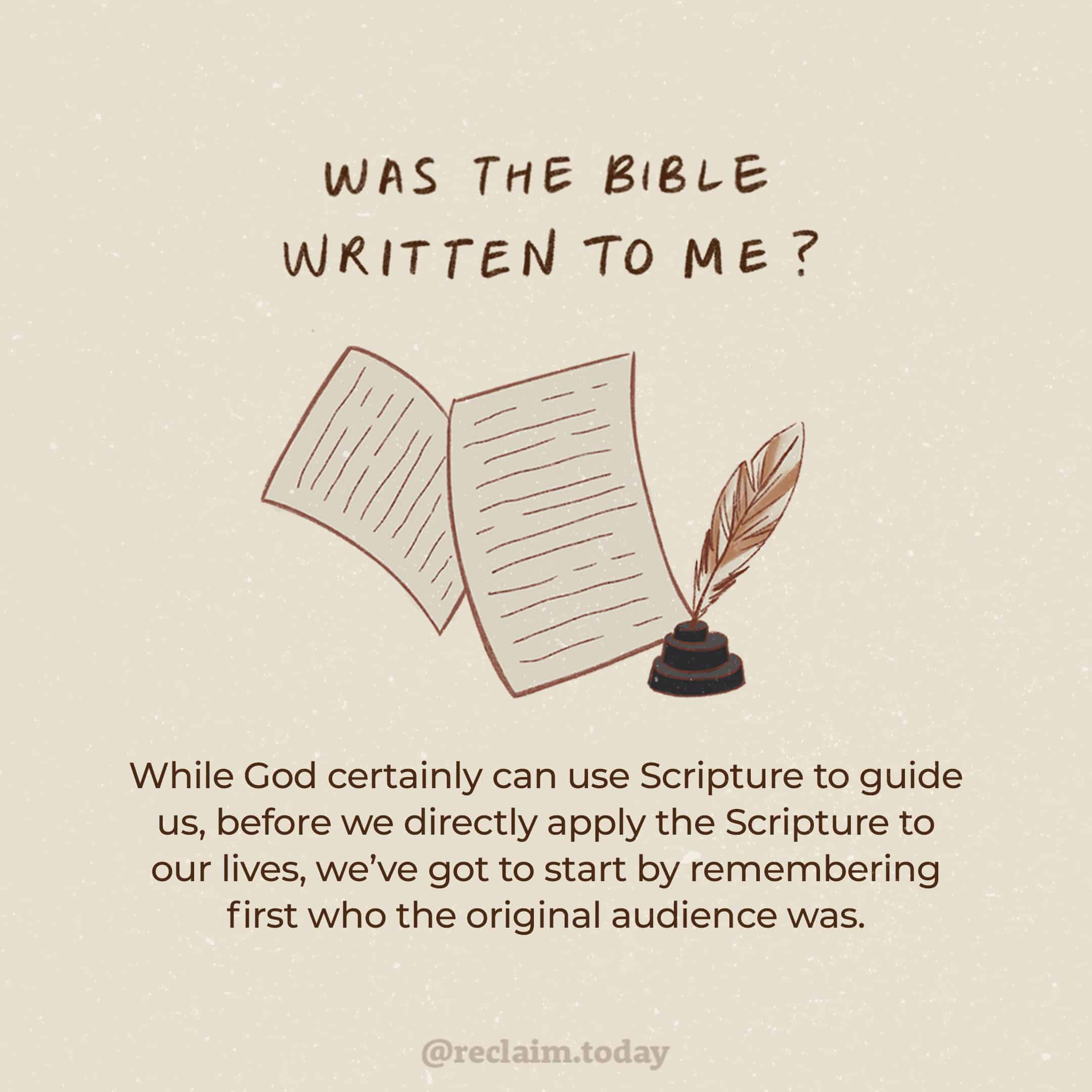
2. Was the Bible written to me?
If you’re considering a big cross-country move, it might be tempting to read God’s message to Abraham, “Go from your country, your people and your father’s household to the land I will show you” (Genesis 12:1) and think, “That’s it! That’s my sign to move!”
But one thing before you start packing your bags… While God certainly can use Scripture to guide us, before we directly apply the Scripture to our lives, we’ve got to start by remembering first who the original audience was.
Maybe you’ve heard the phrase, “all the Bible is written for us, but not all of the Bible is written to us.” This saying helps us recognize that each of the biblical authors had a primary audience they were writing to.
For example: Paul wrote Ephesians to small house churches around the city of Ephesus, and there’s a backstory that we don’t know much about. It appears that the churches near Ephesus needed a reminder that they were called to be unified in peace (Ephesians 4:3). Maybe this was because circumcision was still such a big deal and was causing division (Ephesians 2:11). We don’t know for sure, but either way, Paul was writing this letter for those churches to deal with issues that those churches were facing. So in that way, Ephesians was not written to us. BUT!!!! Do we struggle today with unity and peacefulness? Yes! Ephesians offers a reminder for us today that God’s people should be characterized by creating peace with others. In that way, Ephesians is for us.
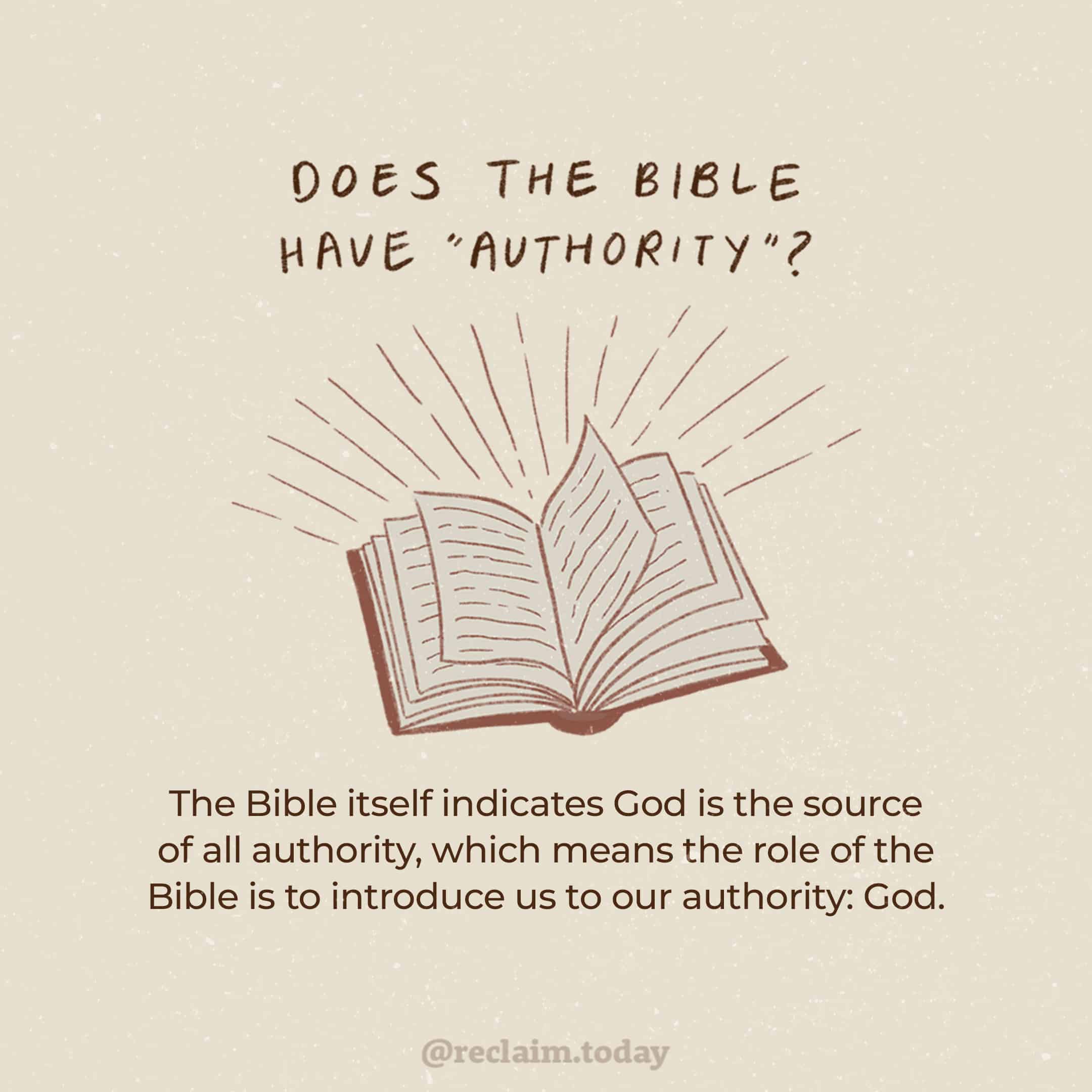
3. Does the Bible have “authority?”
“The Bible is the final authority in my life.” Maybe you’ve heard it said, or have said it yourself. Let’s unpack this statement a bit!
The word “authority” shows up a lot in the Bible, and it often refers to Jesus and his teachings. Maybe you’ve noticed, like in Matthew 7:28-29, where people were amazed because Jesus spoke with authority. There’s another spot where it talks about how Jesus had the authority to forgive sins (Matthew 9:6), drive out evil spirits, and even heal physical illnesses (Matthew 10:1).
Probably one of the best examples was when Jesus was just about to depart earth, and head back home to be with his Father. Before he left, he told the disciples “All authority in heaven and on earth has been given to me. Go therefore and make disciples…” (Matthew 28:18).
So then we have to ask the question, “well who gave this authority to Jesus?” Although the word “authority” isn’t mentioned, Philippians indicates Jesus’s authority was given to him from the Father (Philippians 2:9-11). The Bible seems to suggest that God is the source of authority, and the role of the Bible is to introduce us to our authority: God. Which leads us to our next important question…
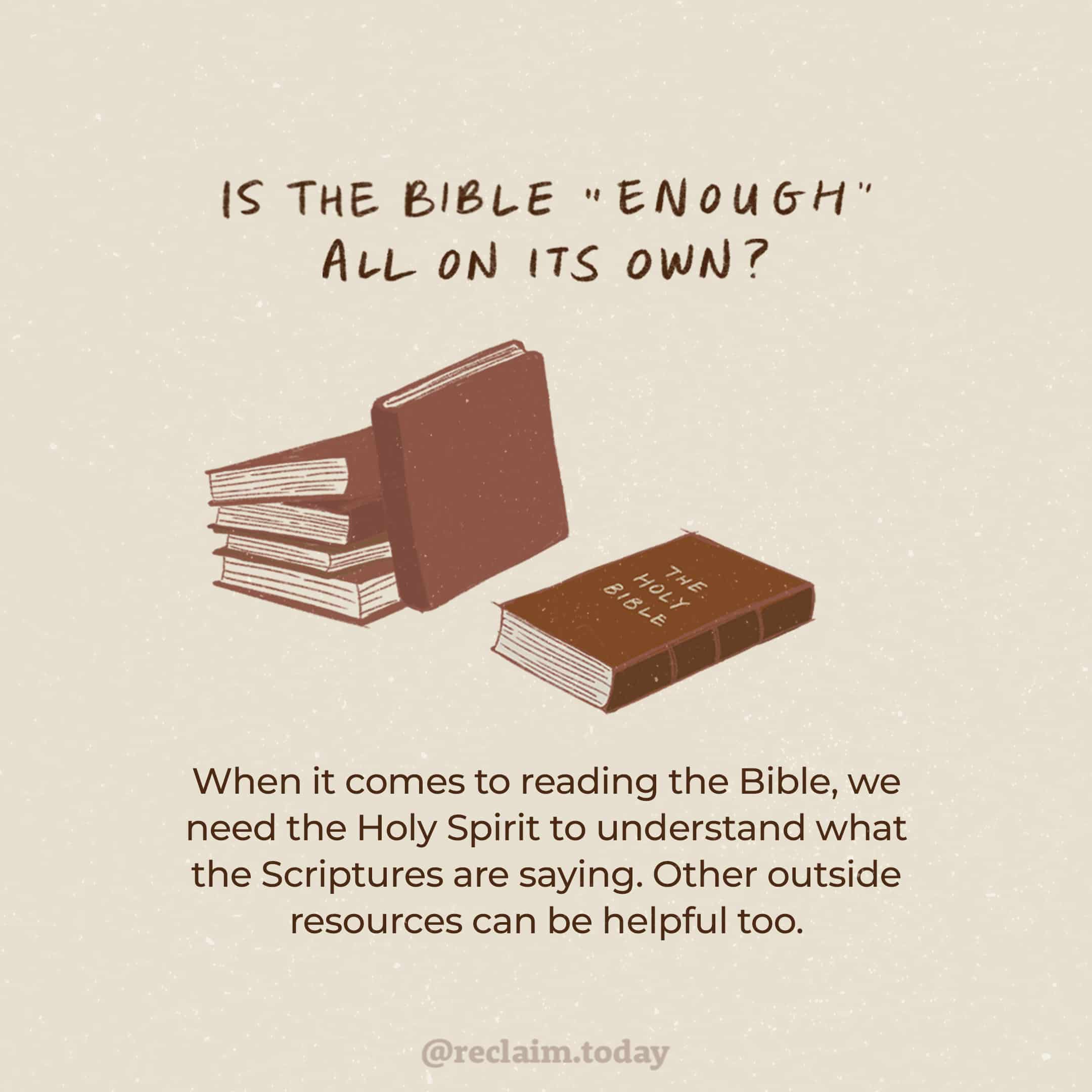
4. Is the Bible “enough” all on its own?
“The Bible is all we need.” Many of us might quickly declare our agreement with this, perhaps because we understand the sentiment behind it. But actually, we need a lot of help to even begin understanding the Bible—this compilation of books, written in a language most of us can’t read, to an audience most of us don’t know much about.
To start, most of us rely on translations to read the Bible, which means we’re also counting on translators—the people who have a better grasp on the original languages and invest in making the Bible accessible in lots of languages.
And, since the Bible was written in a different time and place, we sometimes need other resources to understand what a biblical metaphor means, or why a certain place is important historically, or how a word like “Apocalyptic” in the Scriptures means something different than the way a modern movie might use the word. This doesn’t mean the Bible is in some way lacking—we’re just far removed from the world of the Bible.
Most importantly, when it comes to Scripture, we need the Holy Spirit’s help to interpret the Bible and reveal what God wants us to understand. In a really important section of Scripture, Jesus told his disciples that he would send them a Helper who would teach them all things and remind them of the things Jesus had taught them (John 14:26). This Helper is also called the Spirit of Truth (John 16:13).
The Bible can be really easy to misinterpret. Sometimes people pick and choose verses to claim that the Bible says whatever they want it to say. Sometimes we misunderstand verses and don’t even know it! The Spirit of Truth is with us to help us navigate the Scriptures, and to lead us in wisdom.
When it comes to reading the Bible, we need the Holy Spirit and, at times, we need outside resources and help to understand what the Scriptures are saying.
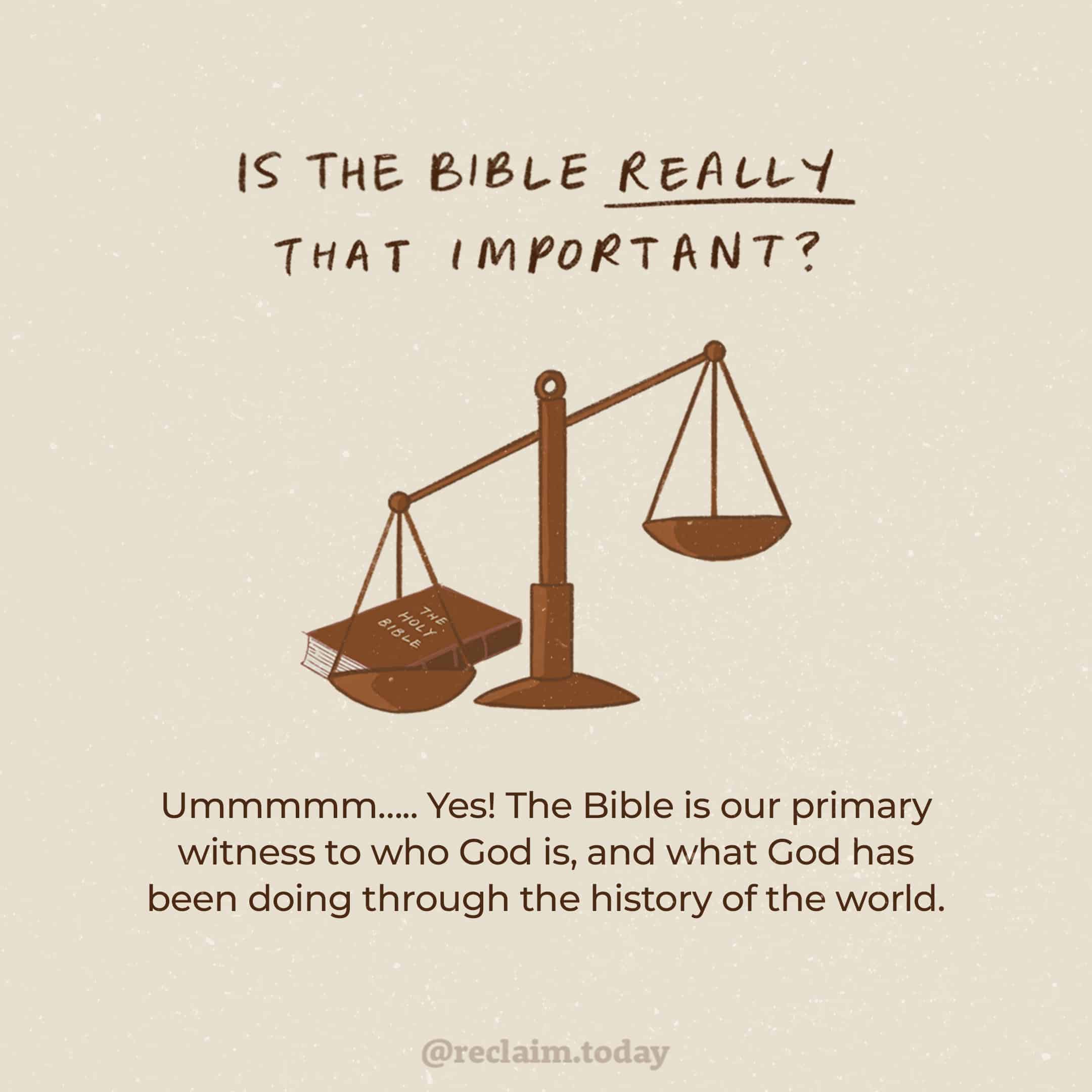
5. Is the Bible really that important?
Ummmmm….. Yes! 100% yes (that’s an easy answer for us)!
The Bible is our primary witness to who God is and what God has been doing through the history of the world. It’s full of stories about God’s love for the world and us. It’s full of wisdom as the Holy Spirit uses these stories to shape us so that we begin to see God, ourselves, and the world differently.
The Bible is mandatory reading to help us understand God’s heart for the world, and how he was willing to lay down his life to be in relationship with us. Without the Bible, we wouldn’t have contextual pictures of the Law Giver’s (i.e. God’s) justice as presented in the Law of Moses.
Without the Bible, we wouldn’t have the Psalms that show us it’s okay to come to God with whatever emotions we are feeling, whether positive or negative.
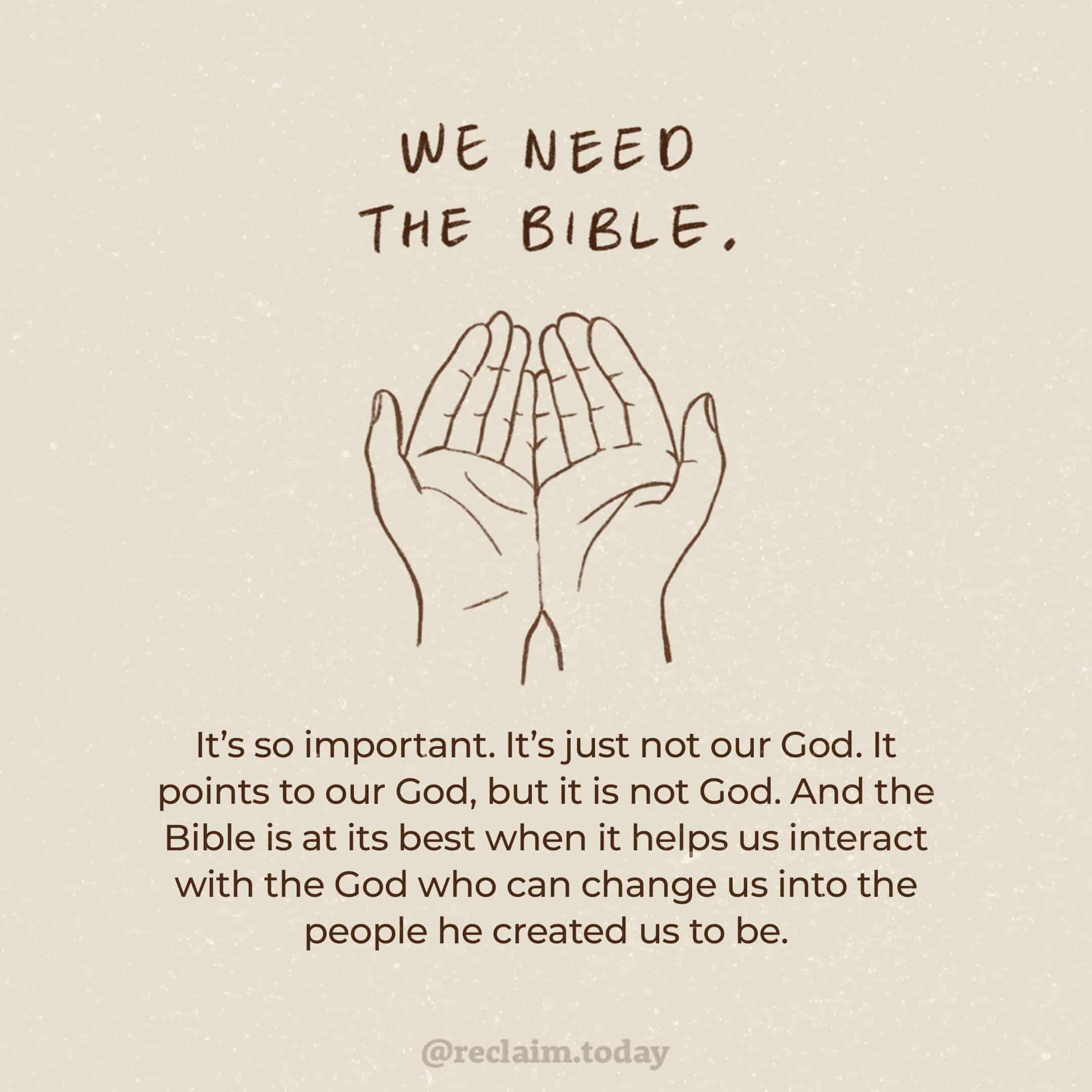
We need the Bible.
The Bible is where we discover Jesus’s story in all its glory, and the story of how the Jesus movement became the Church. So, yes. We desire to do what the Bible says. And, yes. We need the Bible. It’s so important. It’s just not our God. It points to our God, but it is not God. And the Bible is at its best when it helps us interact with the God who can change us into the people he created us to be.
Reclaim Today is a lifestyle content brand that creatively explores meaning in the everyday moments of life. We're discovering together how faith and the good news of Jesus helps us reclaim the small moments, the big ones, and everything in between.

